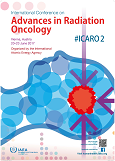Speaker
Renato Padovani
(ICTP)
Description
Introduction
The Abdus Salam International Centre for Theoretical Physics (ICTP) and the Trieste University have initiated in 2014 a Master of Advanced Studies in Medical Physics a two-years training programme in Medical Physics. The programme is designated to provide young promising graduates in physics, mainly from developing countries, with a post-graduated theoretical and clinical training suitable to be recognised as Clinical Medical Physicist in their countries.
Presently, the 3 cycles of the programme have seen 49 participants from 33 Countries: Africa (19), Asia (11), Central and South America (14), and Europe (5), selected from more than 400 applicants per year. Scholarships are awarded to candidates from developing countries with support of the IAEA, TWAS (Third World Academy of Sciences), KFAS (Kuwait Foundation for the Advancement of Sciences), ACS (American Cancer Society), IOMP, EFOMP and ICTP.
Material and methods
The programme is developed following the recommendations of IOMP and IAEA for education and clinical training. In the first year 332 lectures and 228 hours of exercises are devoted to all main fields of medical physics: Anatomy and physiology as applied to medical physics, Radiobiology, Radiation physics, Radiation dosimetry, Statistics, Monte Carlo simulation, Physics of nuclear medicine, Medical physics imaging fundamentals, Physics of diagnostic and interventional radiology (X rays, US, MRI, Hybrid systems), Physics of radiation oncology, Radiation protection, Information technology in medical physics. Each course has a final written or oral exam.
The second year is spent in one of the 19 Medical physics department of the hospitals’ network for the clinical training in: radiation oncology or diagnostic and nuclear medicine, on a programme developed adapting the IAEA (TCS 37, TCS 47 and TCS 50) and the AFRA guidelines. The clinical training is developed following a pre-defined Portfolio of activities, adapted for each Resident according to their previous experience in the field. The recommended time devoted to each sub-topic of Radiation Oncology is reported in the table 1.
Conclusions
IOMP, EFOMP and IAEA are seeing this initiative, a unique experience at the world level, as an answer to the growing demand of Medical Physicists in developing Countries. The programme has been recently received an international accreditation by IOMP and represents an important contribution of the European medical physics community to the development of medical physics in the developing world.
| Country | Italy |
|---|
Primary author
Renato Padovani
(ICTP)
Co-authors
Alberto Torresin
(Niguarda Hospital Milan)
Aldo Valentini
(Trento Hospital)
Alessandro Turra
(Ferrara University Hospital)
Andrea Crespi
(Monza Hospital)
Antonio Traino
(Pisa University Hospital)
Carlo Cavedon
(Verona University Hospital)
Claudio Foti
(Udine University Hospital)
Edoardo Milotti
(Trieste University)
Gabriele Guidi
(Modena University Hospital)
Giovanna Sartor
(CRO Aviano)
Hrvje Hrsak
(Zagreb Oncology Hospital)
Lidia Strigari
(IFO Roma)
Luciano Bertocchi
(ICTP)
Luigi Rigon
(Trieste University)
Marco Brambilla
(Novara University Hospital)
Mario De Denaro
(Trieste University Hospital)
Marta Paiusco
(IOV Padova)
Paolo Francescon
(Vicenza Hospital)
Renata Longo
(Trieste University)
Roberto Ropolo
(Torino Hospitals)
Stefania Maggi
(Ancona University Hospital)
Stefano Andreoli
(Bergamo Hospital)

